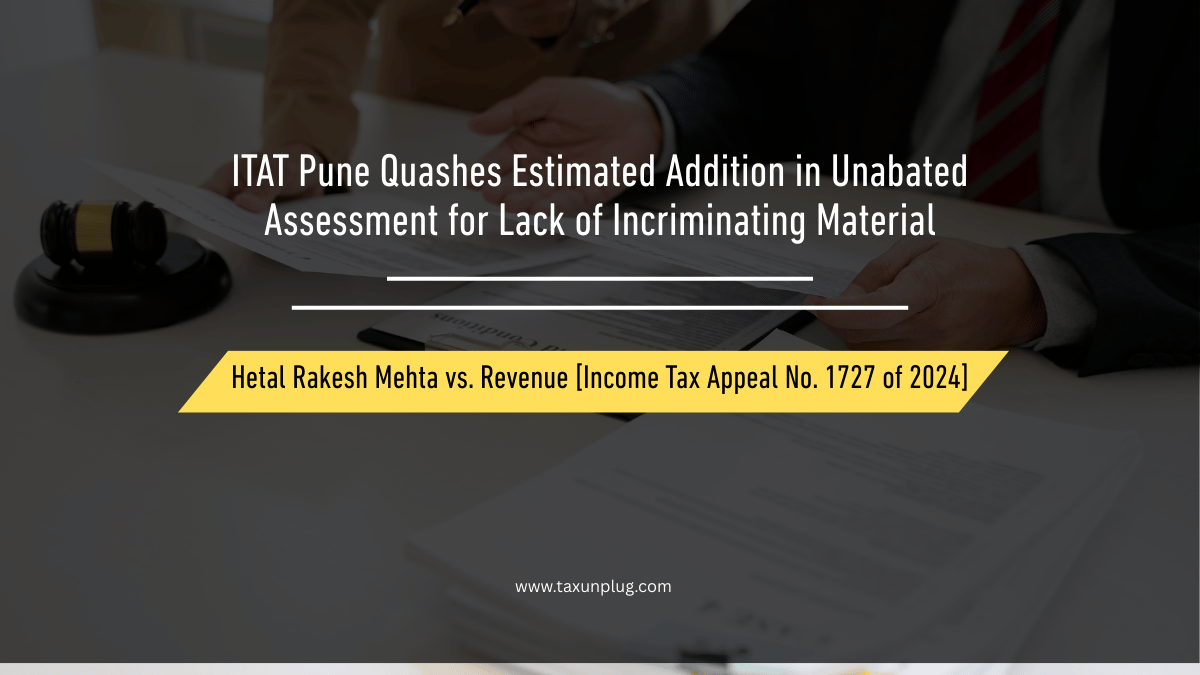ITAT Pune Quashes Estimated Addition:
Hetal Rakesh Mehta vs. Revenue [Income Tax Appeal No. 1727 of 2024]
Background of the Case
The appellant had filed income tax return for AY 2018-19 on 30th October 2018. Subsequently, a search operation was conducted under Section 132 of the Income Tax Act on 6th November 2019 at the business premises of the assessee located in Pune. Notably, this search took place after the expiry of the time limit for issuing a notice under Section 143(2), which is the normal window for initiating a scrutiny assessment. At the time of the search, the assessment for the year was considered “unabated,” meaning the regular scrutiny process was not pending. During the search, no incriminating documents, evidence, or material relating to undisclosed income were found from the assessee’s premises.
However, the Assessing Officer made an addition by estimating 1% commission on the sales, based solely on a statement recorded from a third party. The AO treated this as evidence of undisclosed income despite the absence of any incriminating material seized during the search. This raised a legal issue about whether such additions could be sustained without direct incriminating evidence in an unabated assessment following a search.
Arguments by the Appellant
The appellant strongly contested the addition and argued that once the time for issuing a notice under Section 143(2) expired, the regular assessment process stood closed and hence, the assessment was “unabated.” In such a scenario, the AO could not make additions solely based on third-party statements, especially when the search yielded no incriminating evidence or documents linking the appellant to undisclosed income. The appellant relied on judicial precedents including the Supreme Court judgment in PCIT vs. Abhisar Buildwell (P.) Ltd. which emphasized that in unabated assessments, no additions can be made without incriminating material discovered during the search.
Furthermore, they cited decisions from various High Courts and the Tribunal, which held that statements recorded under Section 132(4) cannot be treated as incriminating unless corroborated by evidence found during the search. The appellant insisted that the AO’s estimate was merely speculative and based on hearsay, not supported by any tangible evidence or material seized during the search operation.
Respondent’s Response
The Revenue, on the other hand, argued that the addition was justified as it was based on the business practice of charging commission on bogus sales, supported by the statement of the third party who was in possession of relevant financial information. The AO and the CIT(A) had accepted this reasoning and held that the commission amount represented undisclosed income that should be taxed. The Revenue contended that the absence of incriminating documents during the search did not prevent the AO from relying on credible third-party statements to make an addition. They maintained that the AO’s estimate was a reasonable approximation in light of the facts and the information collected during the investigation.
Court Findings and Decision
The ITAT Pune ruled in favor of the appellant and held that the original return was filed before the search and the notice period for scrutiny had expired, classifying the assessment as unabated. The Tribunal reiterated the Supreme Court’s ruling in PCIT vs. Abhisar Buildwell, which clearly states that in unabated assessments, additions cannot be made unless incriminating material is found during the search or requisition. The Tribunal further relied on the Delhi High Court’s judgment in PCIT vs. Harjeev Agarwal, which clarified that statements recorded under Section 132(4) are not incriminating on their own unless corroborated by evidence found in the search. Since no incriminating material was found in the search and the addition was based purely on an estimate from a third-party statement without corroboration, the Tribunal held the addition was unsustainable.
Consequently, the ITAT deleted the addition of 1% commission on sales, setting aside the orders of the AO and CIT(A). This decision reinforces the principle that assessments based on search operations must be supported by concrete evidence and not on mere statements or assumptions, especially when the assessment is unabated.
To download official order, Click Here
“The site is for information purposes only and does not provide legal advice of any sort. Viewing this site, receipt of information contained on this site, or the transmission of information from or to this site does not constitute an attorney-client relationship. The information on this site is not intended to be a substitute for professional advice.”

